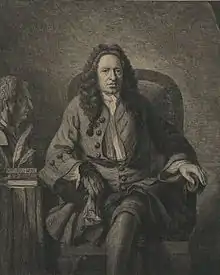Christopher Robinson (Irish judge)
Christopher Robinson (1712-1787) was an Irish barrister and judge, who for many years was the senior ordinary judge of the Irish courts of common law. He is best remembered for his collection of legal textbooks, which forms the basis of the Library of the King's Inns.[1]

He was born in Dublin, eldest son of Bryan Robinson, Regius Professor of Physic at the University of Dublin and President of the Royal College of Physicians of Ireland, and his wife Mary.[2] The Robinson family came originally from Clapham, North Yorkshire. He had two brothers, one of whom, Robert, became a doctor, and in time like his father was elected President of the Royal College of Physicians. Christopher was tutored at home, and matriculated from the University of Dublin in 1729. He entered Lincoln's Inn in 1732, was called to the Bar in 1737, and took silk in 1745.[2] He acted on occasion as an extra judge of assize. He was appointed a judge of the Court of King's Bench (Ireland) in 1758 and served on the Court until his death almost thirty years later. He was also seneschal of St. Patrick's Cathedral, Dublin.[2]
He married Elizabeth Martin, daughter of the Reverend Hartstonge Martin of Cashel, County Tipperary and his wife Susan Wemyss in 1758, and had a son, also named Christopher, who became a clergyman.[3]
His seniority on the Bench made him a public figure of some importance, but he was never popular.[4] He had strong and sometimes controversial political opinions: in particular he was opposed full independence for the Parliament of Ireland, which was a cause dear to the hearts of Henry Grattan and his Irish Patriot Party.[4] On account of his political opinions he was savagely attacked by pamphleteers, notably Robert Johnson, himself a future judge who eventually destroyed his career by anonymous attacks on his colleagues. Robinson himself was accused of writing vicious and scurrilous anonymous pamphlets, but Elrington Ball judges this to be unlikely. His manner was acerbic: one pamphlet refers to his "sarcastic sneer".[5] On the other hand, Ball argues that his charges to Dublin grand juries show him to have been both intelligent and humane.[6]
He amassed a large collection of legal textbooks; after his death his son, Christopher, having no use for them, put them up for sale. The Benchers of the King's Inns agreed to buy most of the collection, and this formed the basis of the King's Inns Library.[7]

References
- Kenny p. 248
- Ball p.210
- Lodge p.75
- Ball p.169
- Ball pp.170-171
- Ball pp.169-70
- Kenny p.188
- Ball, F. Elrington The Judges in Ireland 1221-1921 London John Murray 1926
- Kenny, Colum Kings Inns and the Kingdom of Ireland Dublin Irish Academic Press 1992
- Lodge, John Peerage of Ireland Vol. 6 Dublin 1789